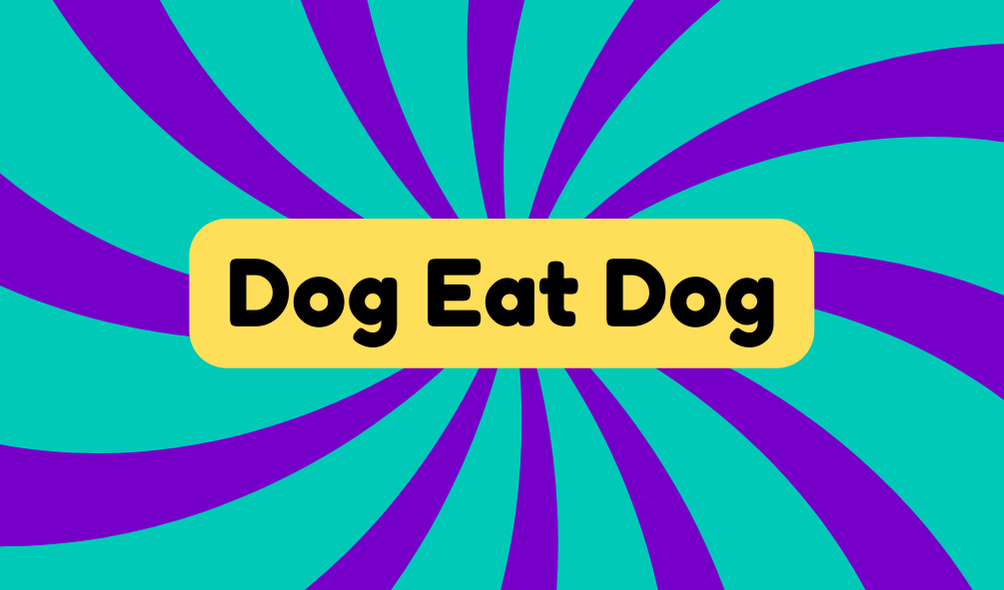The term "dog-eat-dog" refers to a ruthless environment where individuals aggressively compete for success, often neglecting ethics and empathy. In such settings, personal interests take precedence, leading to cutthroat behavior and strained relationships. This concept reflects a growing trend in society, where ambition frequently overshadows morality. As organizations adopt these competitive norms, the consequences of such a mindset raise questions about the true cost of achievement. More insights into this complex issue await those who explore further.
Synonyms
In a world characterized by relentless competition, the phrase "dog-eat-dog" finds its echoes in several synonyms that reveal the harsh nature of such environments. This competitive landscape can foster a strong survival instinct, where individuals are often pitted against one another, leading to a culture devoid of ethical considerations. Understanding the linguistic alternatives broadens the perspective on such ruthless scenarios:
- Cutthroat
- Ruthless
- Every man for himself
- Sink or swim
- Merciless
These synonyms illustrate a relentless pursuit of success, often overshadowed by the impact on personal values and relationships, serving as a reminder of the potential costs of aggressive competition.
Example of Sentences
The phrase "dog-eat-dog" captures the essence of a reality where individuals prioritize personal success above all else. This mindset fosters a competitive environment where survival tactics often overshadow empathy. The following examples illustrate this harsh reality:
- The only rule of the marketplace was dog-eat-dog.
- It's a dog-eat-dog environment.
- One has to look out for personal interests; it's dog-eat-dog.
- The company fired an employee two days after a heart attack; it's certainly dog-eat-dog.
- In this dog-eat-dog world, survival requires doing whatever it takes.
Such examples reveal the dire consequences of prioritizing self-interest over community.
Origin
The phrase "dog eat dog" stands as a stark reflection of society's competitive nature, a reminder of how far competition can drive individuals. Its etymological evolution shows that the idiom contradicts earlier sentiments like the Latin phrase "canis caninam non est," which implies that dogs do not harm each other. The modern usage became popular in the early 1800s. It serves to highlight cultural significance, revealing a shift toward ruthless competition.
| Year | Reference | Significance |
|---|---|---|
| 1543 | Earliest English print | Emergence of the phrase |
| 1732 | Thomas Fuller quote | Reflection on societal ethics |
| Early 1800s | Contemporary usage | Evolution to modern context |
Collocations
Collocations related to the phrase "dog eat dog" reveal the ways language captures the essence of cutthroat competition in various contexts. In a competitive market, the implications of a dog-eat-dog mentality are clear, highlighting a ruthless rivalry that often prioritizes self-interest over ethical behavior. This perspective underscores a harsh reality, where:
- Survival demands relentless ambition
- Organizations cultivate a cutthroat culture
- Relationships are undermined by selfishness
- Success is achieved at the expense of others
- Integrity becomes a casualty in the pursuit of victory
Such language choices reflect an unsettling acceptance of aggression as a norm in professional and educational arenas.
How to Use in Everyday Language
In everyday conversation, phrases like "dog eat dog" can serve as stark reminders of the competitive nature woven into various aspects of life. The expression highlights survival instincts that drive individuals to prioritize personal gain over collaboration. In many environments, such as business or education, competitive dynamics often lead to destructive behaviors, where ethics fade under the pressure of ambition. Using this phrase encourages reflection on those harsh realities, prompting discussions about the costs of relentless competition. Ultimately, familiarity with "dog eat dog" provides insight into motivations that may compromise integrity, drawing attention to the challenges of maintaining a balanced perspective.
Why Is It Still Relevant Today?
Why does the concept of "dog eat dog" continue to resonate in today's society? In a world increasingly driven by competitive strategies, this philosophy becomes a lens through which to view human behavior. Businesses often prioritize success over ethics, disregarding the ethical implications of ruthless competition. This mindset permeates education, where students may compromise integrity for higher grades. Such environments breed bitterness, fostering a cycle of self-interest. As individuals navigate these challenges, the relevance of "dog eat dog" serves as a reminder of the precarious balance between ambition and morality, prompting critical reflection on the cost of achievement in modern life.







